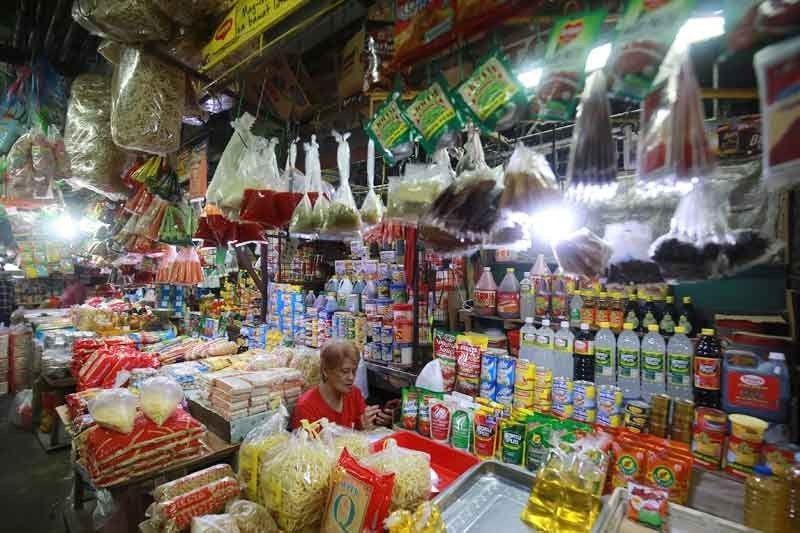Economic managers say prices of goods to stabilize soon

MANILA, Philippines — The administration’s economic managers assured the public that prices of basic goods would stabilize soon now that the government has started introducing key interventions.
They gave the assurance at a meeting with Senate committee on finance chair Loren Legarda last Friday.
Budget Secretary Benjamin Diokno, Finance Secretary Carlos Dominguez III, National Economic and Development Authority (NEDA) chief and Socioeconomic Planning Secretary Ernesto Pernia and Bangko Sentral ng Pilipinas assistant governor Francisco Dakila Jr. briefed Legarda on how the government is addressing inflation, which has reached a record nine-month high.
From 5.2 percent in June this year, the country’s inflation rate reached 5.7 percent in July and 6.4 percent in August.
“We tried to analyze the causes of food and transport inflation and even the depreciation of the peso. We also factored in the effects of monsoon rains and drought, as well as issues in the world market and prices of oil. There are interventions being made in terms of policy and executive action,” Legarda said in a statement.
During the briefing, the economic managers noted that several steps have been taken to address the rising price of rice, which has been going up due to supply issues.
They said that 4.6 million sacks of rice would immediately be released from National Food Authority (NFA) warehouses to the markets.
The economic managers also called on the Senate to immediately approve the proposed rice tariffication law in order to stabilize the supply of the food staple and consequently bring down its price.
The NFA Council is expecting the delivery of around two million sacks of rice by the end of the month.
Another five million sacks would also be arriving over the next one and half months, and five million more would be imported early next year.
Legarda urged the officials to also focus on addressing rice wastage in order to reduce the need to import more rice.
She said that around 800,000 metric tons of milled rice is wasted due to improper handling, transport and storage.
“There should be a designated authority or task force to address this wastage. If we can reduce even half of rice wastage, it would mean less importation as well,” Legarda said.
The Department of Trade and Industry (DTI), NFA, Philippine National Police (PNP), National Bureau of Investigation (NBI) and farmer groups would also be forming a team to monitor the movement of rice shipments from ports to NFA warehouses and to retail outlets.
With regard to the price of poultry, the Department of Agriculture is set to introduce a system that would allow producers to sell directly at the public markets.
The Sugar Regulatory Administration would also be opening the importation of sugar to direct users while the Bureau of Customs would prioritize the release of essential food items in the ports.
“All the causes of inflation will be addressed. Soon, there should be better supply of goods. But we should also ensure that prices are controlled. We should counter hoarding and profiteering, and there should be stricter monitoring of prices to prevent unscrupulous individuals from manipulating the prices of goods,” Legarda said.
Despite assurances from the economic managers, inflation might even worsen due to the impact of Typhoon Ompong on crops and infrastructure, according to Rep. Michael Romero of party-list group 1-Pacman.
“Ompong will have adverse and lingering impact on the supply of rice and vegetables that will cause retail prices to jump yet again this month until October,” Romero said.
He said Ompong damaged crops in rice-producing provinces in the north, where it made landfall, including Isabela and Cagayan, and vegetable farms in Benguet and Mountain Province.
He said the depreciation of the peso against the US dollar would further add to inflation pressures.
Romero urged President Duterte to form a task force that could launch a “coordinated attack on inflation.”
He said the nation could have a bleak Christmas if the continued rise in prices is not arrested.
Anticipating price hikes in provinces devastated by Ompong, Anakpawis Rep. Ariel Casilao asked President Duterte to order a price freeze in these areas.
“The Duterte government should order a price freeze to control prices of basic goods. This will prevent unscrupulous traders from exploiting the situation in typhoon-hit provinces,” he said.
Camarines Sur Rep. Luis Raymund Villafuerte urged the Senate to speed up the approval of the rice tariff bill “to clear the way for more rice imports and pull down the retail cost of the staple by as much as P7 per kilo.”
He said Congress should support President Duterte’s counter-inflation agenda, which includes replacing volume restrictions on rice importation with tariff.
“Much lower rice prices would ease inflation because rice accounts for a big part of ordinary Filipinos’ food expenses, which consume most of their income,” he said.
He cited a Bangko Sentral ng Pilipinas projection that a rice price reduction could cut inflation by .4 percent.
“Lower prices would benefit farmers, too, as they are also rice consumers. Moreover, farmers would benefit from revenues to be raised from the imposition of tariffs. This would boost their harvest in the long run,” Villafuerte, one of the rice tariff bill’s authors, stressed.
For his part, Davao City Rep. Karlo Nograles called on the NFA to intensify its palay procurement in provinces hit by Omgpong.
“The NFA should buy even the wet produce harvested by farmers because traders would be hesitant to buy it or would get it at lower prices,” he said.
He said the rice agency should increase its buying price from P17 per kilo to P22 so it would be able to compete with traders.
“With buffer stocks down and imported rice not expected to arrive until November, the onus is on the NFA to find and purchase additional rice stocks as soon as possible and at a better price,” Nograles said.
- Latest
- Trending





























